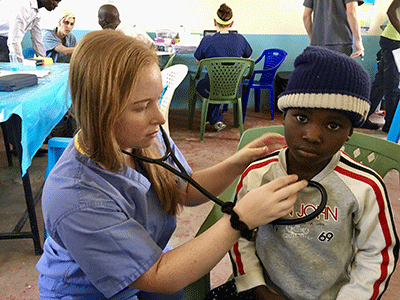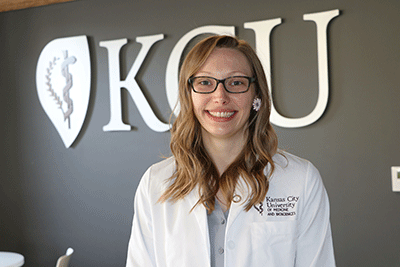Are doctors talking with patients about sexually transmitted disease? How quickly would the cycle of sexually transmitted infections be broken if the partners of every person diagnosed could be treated as well? A couple of Kansas City University of Medicine and Biosciences students believe answers to those questions could be keys to reversing an American crisis.
Megan McMurray and Mianna Armstrong, fourth-year medical students with a keen interest in treating sexual health found the recent Centers for Disease Control (CDC) statistics documenting a rise in sexually transmitted infections rates alarming. They decided to dig further into the issue with the goal of bringing awareness to a health problem that will almost certainly affect their future patients, and the hope of offering a solution to a disturbing national trend.
 Megan McMurray, OMS IV Megan McMurray, OMS IVOn a Global Health Track Medical Mission Trip |
 Mianna Armstrong, OMS IV Mianna Armstrong, OMS IVOn KCU Kansas City Campus |
In an article published by the Journal of the American Osteopathic Association, titled "Addressing the Increased incidence of Common Sexually Transmitted Infections," McMurray and Armstrong point to evidence that reveals infections of chlamydia, gonorrhea, and syphilis are at an all-time high according to the CDC’s report on 2016 data.
This includes 1.6 million new cases of chlamydia (a 4.7% rise compared to 2015), 470,000 new cases of gonorrhea (a 22% rise among men and 13.8% rise among women compared to 2015), and syphilis cases more than doubling in women since 2012. The student’s research notes that untreated infections can result in fertility problems, babies born with the disease and include deaths among newborns because of it.
“I hope that providers, particularly medical students, will understand that this trend will only continue to worsen unless we take on the challenge of educating our patients and advocate for the resources to do so,” said Armstrong.
One of the solutions McMurray and Armstrong call for is Expedited Partner Therapy (EPT): treating the sex partner of a patient diagnosed with a sexually transmitted infection with prescriptions, even if the partner is unwilling or unable to seek treatment themselves.
"In these situations treating the partner without seeing them has the benefit of breaking the re-infection cycle,” said McMurray. “It can help abate the passing of infection back and forth between partners,” added Armstrong.
EPT is illegal in the states of Kentucky and South Carolina. It is limited in Alabama, Delaware, Kansas, Oklahoma, New Jersey, Virginia and Puerto Rico. There is concern physicians practicing in the states where the practice is legal may not be aware that EPT is an option, or educated on how to proceed with treatment.
Inspired by their work, the American Osteopathic Association (AOA) drafted and approved a resolution to advocate for the legalization of EPT as outlined by the CDC.
“We didn’t expect that,” said Armstrong. “But we are thrilled. We believe this advocacy at the national level will help bring more awareness to the benefits of EPT.”
The student doctors identify poor history taking and a lack of screening by health care professionals as potential contributing factors to the spread of sexually transmitted infections as well as long-term health complications.
As young, female physicians, both women realize they are part of a new generation with the ability to speak more freely with patients about their sexual health. They are hopeful their fellow future physicians and patients feel the same way.
“There’s no doubt that sexually transmitted infections can be an uncomfortable topic for many people,” McMurray noted. “Because STI’s are so prevalent and have such far reaching consequences, the doctor’s office is one place that sexual health should be discussed openly and without judgment. This is something we feel very passionate about.”



(0) Comments